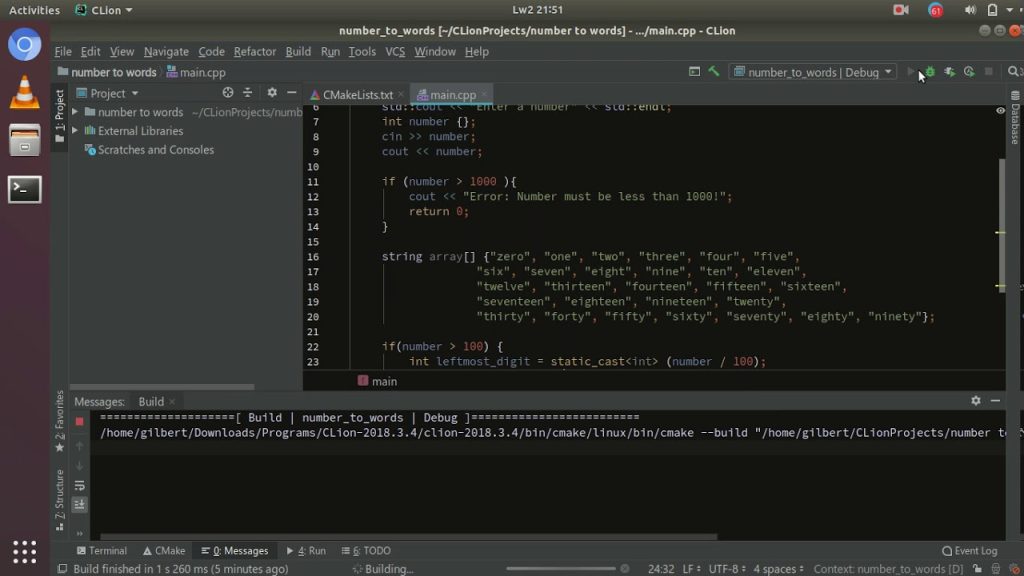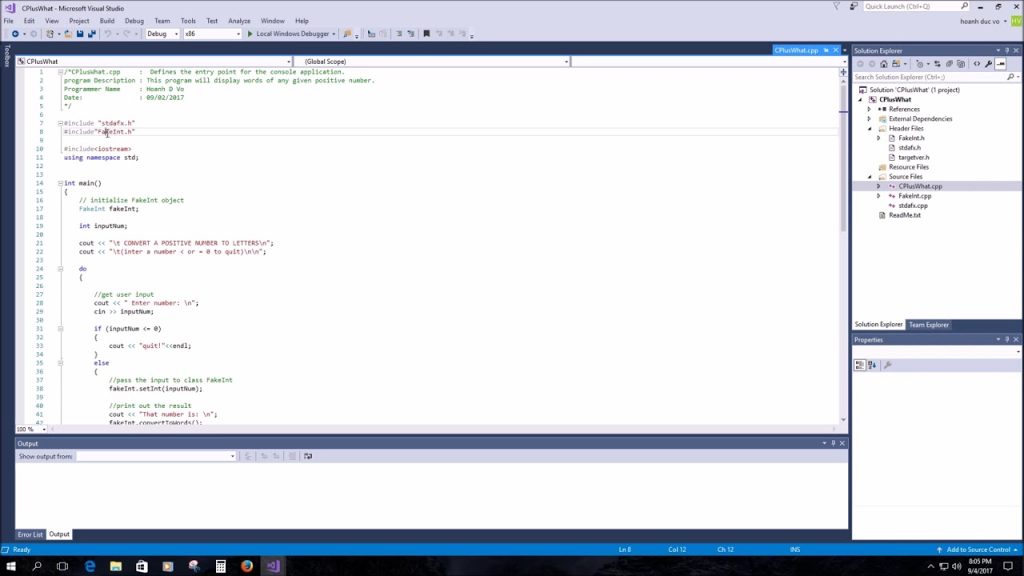Convert Number Into Words in C++ We, first and foremost, create two arrays of string. The first named “first” contains spelling of numbers from zero to ninety excluding “second” values like ten, twenty, etc. Secondly, we really want to separate the numbers from the value entered. We do this using “%”(Modulus Operator) and “/”(Division Operator).
Each condition have is utilized to print the number and after that there postfix like hundred, thousand etc. After the print of the principal digit, then condition calls the program itself. This continues till the last digit of the number is printed.
I came across this program in a book to convert number into words. The initial program converts numbers 1-1000 however at that point you are asked to change the program to accept numbers up to a million. I made it stir with Convert Number up to 20,999 yet can’t inspire it to work past that. I’ve been tinkering with it all day and taken a gander at a ton of program examples online yet everybody that I took a gander at is using techniques that are past me as a beginner. Any advice would be greatly appreciated. This is what I have up until this point.

C++ Program to Convert Number in Words
In C++ language, we can easily convert number in characters by the assistance of loop and switch case. In this program, we are taking input from the client and iterating this number until it is 0. While iteration, we are dividing it by 10 and the remainder is passed in switch case to get the word for the number.
Loop Statement in C++
In while loop, condition is evaluated first and on the off chance that it returns valid, the statements inside while loop execute, this happens repeatedly until the condition gets back false. At the point when condition returns false, the control comes out of loop and leaps to the following statement in the program after while loop.
The important point to note while using while loop is that we really want to utilize increment or decrement statement inside while loop so the loop variable gets changed on each iteration, and eventually condition gets back false.
This way we can end the execution of while loop otherwise the loop would execute indefinitely. Some time loop that never stops is said to be the infinite while loop, when we give the condition in such a way so it never returns false, then the loops becomes infinite and repeats itself indefinitely.
Switch Case Statement in C++
Switch statement in C tests the value of a variable and compares it with different cases. Once the case match is found, a block of statements associated with that particular case is executed.
Each case in a block of a switch has an alternate name/number which is alluded to as an identifier. The value furnished by the client is compared with all the cases inside the switch block until the match is found.
exit() Function in C++
The exit function terminates the program normally. Automatic objects are not obliterated, however static objects are. Then, all functions registered with atexit are called in the opposite request of registration. The code is gotten back to the operating framework. An exit code of 0 or EXIT_SUCCESS means successful completion.
On the off chance that code is EXIT_FAILURE, an indication of program failure is gotten back to the operating framework. Different values of code are implementation-defined.

How do you write a program in c++?
You would have to scan the primary digit first. Then, at that point, the second, and set up them. You really want to check for numbers under 20, as they are not constructed as ten-one, or something to that effect, yet eleven, twelve, thirteen, etc.
North of 100, you add 100 to the beginning, and so on. I accept that sooner or later, you’ll have to utilize dashes. This is basically it, yet just for English. Convert Pace From KM to Miles French would very interest, as they count oddly (95 = 20 * 4 + 15, so quatre-vingts quinze). Convert Number me on the off chance that I left out a stage, yet I trust that’s it.
A C++ program that solicitations even integer values from the client is what’s called a “schoolwork assignment,” a task expected of an understudy to assist her with learning.
Schoolwork questions don’t exist because the teachers don’t have the foggiest idea about the answers. They exist in request to get the understudy to think, read, listen, and write.
There are no shortcuts to this. Getting another person to do your schoolwork is cheating. Without a doubt, it’s breaking the guidelines, yet generally, it’s cheating *you *out of your education.
Is it possible to translate words into binary code?
First CPUs or today’s basic ones found in microcontrollers utilize internal state-machine which drives internal signals while instruction is executed. This is ancient 6502 using about 50 years ago in Apple II computers:
CPU instructions are organized in gathering of bits to work on internal logic, one in Instruction Decoder.
This improves on state-machine construction. Anyway, instruction decode and execute could be carried out in hardware like it was in 6502 or using instruction decode ROM like in more up to date plans, eg ARM Cortex. For example, ARM Cortex has ROM, I think, 52 bits wide with signals driving different blocks and scarcely any bits are utilized to define next ROM location assuming instruction requires more execution steps (clocks).
State-machine simply goes through data in ROM, eg for ADD instruction (ADD r0, r1, r2) opcode field selects where execution plan starts in ROM, Rn, Rm, Rd signals select internal registers utilized by instruction while signals from ROM drive other block, eg one signal advises ALU to play out an addition. On last step ROM will tell state-machine to load next instruction from memory and loop continues.
Improvement to this approach are pipelined CPUs. It is told how each instruction has 3 stages, load, decode and execute. Improvement is while current instruction is decoded, next one could be loaded from memory.
















Leave a Reply